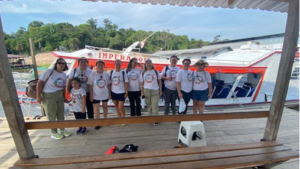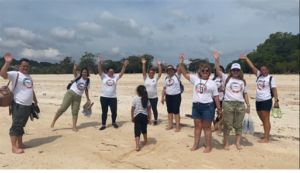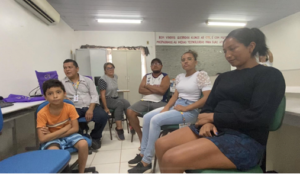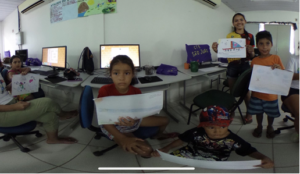News . Best Practices Inquiry Mapping with design thinking to develop a school community’s agenda for the sustainable development of the Village of Tupé da Amazônia

Authors: CONNECT COLEARN (2022).
This open schooling initiative developed by COLEARN network focuses on the empowerment of the Tupé Sustainable Development Reserve located in the Amazon. The project was led by Dr. Alexandra Okada (The Open University -UK) with a team of researchers and practitioners leaders of NGOs, Ms. Rossana Moura (CEO of Anjos Digitais and researcher of IBICT – MCTI), Ms Alberto Okada (UnB; CEUB), Ms Riulma Ventura Muller (UFAM), Dr. Thais Castro (UFAM), and Dr Luciana Ferreira (IRAMA, REDDA). This initative also included some collaborators who supported the group discussion: Mrs Guiomar Pereira Labate, (Action against Hunger), Mrs Silvanei da Silva (Fama Music Instruments); and the photographer Tayanne Grazilelle Rodrigues (IESB).
The GO supporting the project:
Instituto Brasileiro de Informação em Ciência e Tecnologia (IBICT),
unidade de pesquisa vinculada ao Ministério da Ciência, Tecnologia e Inovações (MCTI)
The NGOs involved in this project were:
- IRAMA (Instituto Ribeirinhos da Amazônia)
- REDDA (Reduction of Emissions by Deforestation and Degradation of the Amazon)
- Action Against Hunger (No Poverty and Zero Hunger)
- ANJOS DIGITAIS (digital inclusion and gender equality).
The Tupé Sustainable Development Reserve consists of five villages: Livramento, Julião, Agrovila, Tatulândia, Central and São João do Tupé. A single municipal elementary school located in the riverside building of São João serves these five communities. The participants from the local community were 15 people, including 10 adults and 5 children/teenagers from 2 to 15 years. There were members from the Dessana indigenous and Ribeirinhos ethnic groups.
The activities were carried out at the Municipal Elementary School of Tupé. The Municipal Department of Education granted authorization for the visit of the group in response to a request from the Federal University of Amazonas (UFAM). The researchers obtained ethical authorization for research from the Municipal Secretary of Education of the city of Manaus, State of Amazonas. The study was also approved by the international ethics committee CONNECT.
The Municipal and Elementary School São João is located in the community of Tupé on the banks of a tributary of the Rio Negro. It offers only elementary and primary school. The space is also used by the SEDUC (State Department of Education) to provide Youth and Adult Education (EJA). Young people aged 12 to 17 do not have access to secondary school in this community, which is offered only in the state capital city Manaus (45 minutes away by speedboat).
In open schooling actions, students from other locations were not present because of the intense drought affecting the water regime. The drought time of the river is longer because of climate change, mainly from the source of the Rio Negro – in the region of the dog’s head – near the municipality of São Gabriel da Cachoeira. Due to the drought, boats cannot transport students to school. Classes start in January and end in October.
Caring/ Caring: The community was very receptive and interested in the proposal of open schooling. Initially, the participants were introspective, but after an initial dialogue and engaging activity for introduction, they became comfortable interacting with the researchers in an engaging way. The objectives of the open schooling activity were introduced. They joined the proposal of collective inquiry mapping based on an open schooling experience to identify the challenges and opportunities of the community to face adversities and enhance sustainability.
Open Schooling Co-learning objectives were identified before and during the activity.
The researchers and the community were interested in:
- Understanding what it is and how to do open schooling including communities from Amazonia and universities in Brazil.
- Identifying the important elements to continue open schooling to enhance the quality of education and in particular exploring solutions for the local issues.
- Experiencing an open schooling practice for the production of an ebook “Reserva Tupé 2030”: an agenda of priorities and opportunities.
This open schooling approach using inquiry mapping and design thinking brought together researchers and practitioners in the area of Education, Computer Science, and Psychology as well as community members of the Tupé community and neighboring territories including students, teachers, school head, parents, and local citizens.
Several real-life community issues were identified. The challenges discussed were:
- Secondary school is not offered in the community.
- Basic Education ends in Elementary School phase II, which corresponds to the ninth school year.
- Health service is very limited, there are no doctors and nurses.
- Environmental problems include: reducing waste, lack of safety, the need for water cleaning, poor or lack of sanitation, and insufficient access to energy for all community residents.
Some opportunities for the outside community were also identified:
- The development of Ecotourism.
- Communication channels uniting residents, managers, educators, professionals, apprentices.
- Production of local products (for instance, natural repellents), jewelry, and crafts with seeds and sustainable natural resources.
- Alternative energy as solar energy.
- Open schooling providing projects with young people.
The community raised questions concerning the objective of the study, what benefit it would bring to them, and what would be offered to the community through the partnership with open schooling. It was clarified by the residents and members of the school that the São João community receives many visitors for research, diagnosis, and promises of partnerships, but nothing happens for them.
The co-authoring of an agenda to guide the community in research projects and future partnerships was an initiative well-received by the community. Participants have become very interested and also committed to sharing their local problems. The dialogue opened an opportunity for collaboration between them supported by local and external partners. The production of an ebook, a collective document of the challenges and opportunities of the community, resulted in a process of consolidating the partnership and initiating new proposals and projects. All community members and partners also positioned themselves as co-learners, i.e. one learning from the other. The activity included people of varying ages from Basic Education to Higher Education.
Knowledge: Based on the issues that the community cares about, four curricular topics were identified to support the open schooling project. The local researchers from the university and local educators from the school considered it important to discuss the curriculum for students to develop knowledge with the connection between formal, non-formal, and informal education with real-life problem-solving experienced by members of the community of Tupé:
- Health and well-being: nutrition, local diseases (malaria, dengue, and hepatitis), tooth care.
- Basic infrastructure, health, river transport, sanitation, drinking water, lack of energy, poor internet connection, and regular High School system.
- Professional training (training linked to the production chain and sustainability-focused ecotourism, fish farming, family farming, and general services for the construction and maintenance of the basic infrastructure), local public tender vacancies prioritizing community members for greater commitment. Greater incentive and resources for education and health professionals from other communities working in Tupé.
- Fighting against pollution, care of the environment and biodiversity.
The skills required:
- Collaboration: teamwork, internal and external communication.
- Digital skills: refers to the critical and creative use of local and global knowledge including the internet – reliable sources, critical thinking to detect fake news, security to enhance data protection, computational thinking for teachers and students to learn how to create, adapt and reuse APPs – applications, games, and gamification for significant development of the entire Tupé population and aggregate communities. The educational packages installed by the Municipal Department of Education (SEMED) should be expanded. The current digital resources are GCOMPRIS game packs on Linux, chess games, memory game, text editor and drawing, Google for Education package.
- Scientific thinking for collaborative research: refers to the process of problem-solving and innovation based on evidence-based thinking and scientific inquiry-based learning involving all representatives of Tupé society: students, teachers, managers, citizens, researchers, and local professionals.
Do: Participants completed all activities:
- Individual diagnostic interview
- Discussion and mapping of diagnostic evaluation results
- Group conversational dynamics using research mapping and design thinking to record information needed to present the prototype
- Presentation of the findings of each group: challenges and opportunities
- Final reflection of the process and presentation of prototype/results including next steps
- Local visits and testimonials
- Agenda Review
- Prioritization of actions
The next steps will be discussing the outputs integrated with key local documents and scientific literature references that will be available for the community to access from the computer laboratory.
With the purpose of guiding the teaching and learning actions of more than 250,000 students of Manaus, through the SEMED, the new “Municipal School Curriculum” was launched in 2021, with linguistic review, diagramming and better adaptation to all, including riverside communities.
Link: https://drive.google.com/file/d/1kTJ0oMA6cQk83E_YAVfLzgrdr5m0WYbv/view
Findings related to the approach of Open Schooling: The activity was based on the open scenario – inspired by active methodologies (creative and participatory) such as consensual dialogue, co-creation, investigative mapping with design thinking for communities. Open schooling was considered useful and challenging. The agenda began with local problems and was finalized with a representative who summarised the views of the community and the value of education for the local population. Community members became more aware of local priorities and also felt more united. “We have to thank you. Changing is not easy. We need to be strong to want, know and do. Having regular high school in this community is not a favor, it’s a right.”
Results for co-learning: Participants recognized that this initiative is challenging because in order to change it is necessary to have a great connection with the priorities that the community cares about, as well as knowledge to solve problems and the development of actions for overcoming local challenges.
Education, better teaching conditions, transportation for children to get to school, access to doctors and medicines throughout the year including during periods of drought, energy and basic sanitation are some of the community rights. All these issues they were already aware of. However, a key finding was that “something must be done from the union of all members”. This evidence of open schooling can be an approach to enhance the union among the community members from them to do the change that they need based on knowledge and what they care about. This best practice shows that the cocreation of a collective agenda of priorities, challenges and opportunities was a valuable opportunity for them to share their local wisdom and updating/expanding their knowledge including the feedback that they needed and received from the researchers. This enabled them to find alternatives to reduce the barriers, uncertainties, and unknown challenges. This shows that open schooling can be a way to increase communities’ confidence for them to go ahead with their own voices and local wisdom for identifying priorities, enhancing the quality of education, and changing public policies for equality and equity.
The results for the participants were: involvement, pleasure and trust with science and research. Some specific learning outcomes developed were: (1) becoming aware of the concept ‘open schooling’ – both meaning and procedures. (2) identifying new collaborative approaches to explore issues supported by education for democracy, for example, inquiry mapping with design thinking, (3) greater awareness of problems and opportunities for change.
As an example, through the open schooling partnership between the school, university and community, it was identified how and who to contact; for example, the policymakers and procedures to make the request of secondary school in the community of Tupé. Another example of increasing awareness of the issues and communication skills to explore the problems and opportunities was children who voluntarily made illustrations of the problems faced and described by the adults. Using their drawings they prioritised the transportation for everyone to get to school and also the need for greater opportunities to learn outside of school, for example, with family members at home and during the transportation to the school because the boat trip from home to school is a long journey for students who live further away.

The transport from Manaus to the Community takes about 45 minutes by speedboat but a couple of hours by normal boat.

Because of the drought it is necessary to walk a long distance under the hot weather to get to the school.
The school has a computer room and a library in the same space., only 1 room with air conditioner and unstable electricity

It is the only room with air conditioning but with limited use because of the power outage. The internet “low” connection is also limited. To ventilate, the door is then kept open.

One of the open schooling teams including participants of all ages.

The result was very positive with involvement, significance and engagement.
Photographs taken by the community and CONNECT representative Tayanne Grazielle S. Rodrigues